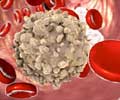Light to moderate exercises were found to affect the mobilization of immune cells in cancer patients.

‘Exercise was found to increase cytotoxic T cells and natural killer cells capable of killing cancer cells. ’





“It was previously thought that cancer patients should just rest after a cancer diagnosis. Today, we have more and more researched information that exercise can even improve the prognosis of cancer. However, it is not yet fully known how exercise controls cancer,” explains Research Assistant Tiia Koivula. Previous preclinical studies have found that exercise affects the functioning of the immune system so that more immune cells are transferred to the tumor site and they become more active in destroying cancer cells.
Only 10-minute Exercise was Enough
The two studies involved 28 recently-diagnosed lymphoma and breast cancer patients. The lymphoma patients were between the ages of 20 and 69 and the breast cancer patients between the ages of 37 and 73.During the study, the patients did a 10-minute exercise on bicycle. Blood samples were taken once before the exercise and twice after the exercise.
“The pedaling resistance was determined individually for each patient so that it corresponded to light or moderate physical activity. The most important goal was that the patients were able to pedal for 10 minutes straight without exhaustion, but so that their heart rate increased,” Koivula describes.
The researchers analysed the number of several different immune cells, which are also known as white blood cells, from the blood samples and compared the numbers in samples before and after the exercise.
Advertisement
“It is especially interesting that we saw an increase in cytotoxic immune cells during the exercise in both patient groups. These immune cells are capable of destroying cancer cells,” Koivula notes.
Advertisement
“Although our results indicate that the higher the exercise intensity is, the more immune cells are transferred from their storage organs into the bloodstream, it is notable that also light or moderate intensity exercise lasting for only 10 minutes will cause an increase in the number of immune cells which are important for fighting cancer,” Koivula encourages.
Koivula says that it is important for patients to find a physical exercise that they enjoy.
“Cancer treatments can make you tired and lower your motivation for exercise, which is why it is comforting to know that just 10 minutes of cycling or walking to a supermarket, for example, can be enough to boost the body’s immune system.”
Does Exercise Transfer Immune Cells to the Tumor?
Tiia Koivula states that, based on the studies, it is not yet known where the immune cells enter the bloodstream and where they go after the exercise.“Further research in cancer patients is needed to study whether the immune cells are transported to the tumor after the exercise, where they could destroy cancer cells. This has been shown to happen in preclinical studies, but research in cancer patients is still rather incomplete,” Koivula says.
Cancer treatments often affect the immune defense by reducing the number of immune cells. When the immune system weakens, the boosting role of exercise can be especially important.
Koivula's immunological studies are part of a larger research project of Academy Research Fellow Ilkka Heinonen supported by the Academy of Finland and the Hospital District of Southwest Finland to investigate the effects of exercise on cancer. The studies were carried out in collaboration with doctors and researchers from the University of Turku and the Cancer Clinic of Turku University Hospital, who also operate at the Turku Immunology Centre and the INFLAMES flagship. Researchers from Karolinska Institutet in Stockholm were also involved in the studies.
The studies were published in Frontiers in Physiology - Clinical and Translational Physiology and Scientific Reports journals in January and April 2023.
Source-Eurekalert















